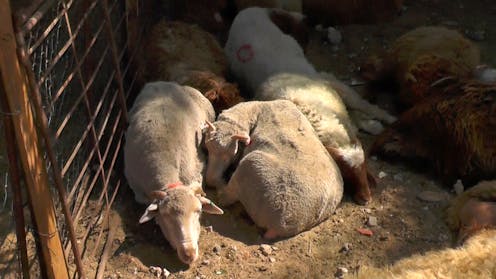Liberal rebel will proceed with bill after government preserves sheep trade
- Written by Michelle Grattan, Professorial Fellow, University of Canberra

The government has rejected calls for a ban on the live sheep trade during the northern summer, but it will require an independent observer on all ships, including for live cattle exports.
A series of required changes to shipboard conditions, announced by Agriculture minister David Littleproud on Thursday, has not satisfied critics, with Liberal backbencher Sussan Ley flagging she will go ahead with her private member’s bill to phase out the trade.
The trade has the potential to become an issue at the election. Labor’s agriculture spokesman, Joel Fitzgibbon, reaffirmed that Labor would “stop the summer trade at the first opportunity. We will also phase out the balance of the trade over time”.
Littleproud told a news conference the government had accepted all the recommendations of the review it had set up, although one recommendation on heat stress risk assessment would need further testing and consultation.
The review, by veterinarian Michael McCarthy, who has had a long association with the industry, followed whistle blower footage, aired on television, showing appalling conditions.
McCarthy says in his report the industry needs to move from using mortality as a measure to “measures that reflect the welfare of the animal”.
“Within the risk assessment model this replaces the mortality limit with a heat tolerance level,” his report says.
Under the changes, sheep will get up to 39% more space, and stocking densities will be reduced by up to 28%. Littleproud said this change would be applied in the current northern summer trade, which is now under way.
The mortality level that has to be reported immediately will be halved from 2% to 1%.
The report says that for the trade to continue, “the public expects the Australian industry to uphold and comply with the highest animal welfare standards throughout the entire supply chain”. The industry is at a “crossroads,” McCarthy says.
“What has occurred in the past must not happen in the future, and industry must therefore retreat to a ‘safe’ position, consolidate and then build a new way forward based on science, trust and performance.”
McCarthy says the new settings “will impose substantial restrictions of many vessels wishing to participate in the trade” during the northern summer.
It has been an open secret that the government hopes tougher standards might make some of the operations unprofitable.
Littleproud said the recommendation for changing the heat stress assessment “potentially produces fluctuations in stocking density of between 18% and 79%‘”. The report said the proposed change needed technical review.
The independent inspectors will provide daily reports and footage of conditions.
Littleproud also announced tougher fines for breaches.
Confirming she would proceed with her private member’s bill for a five-year phase out of long-haul sheep live exports, Ley said the McCarthy recommendations did not go far enough.
“Scientific advice from the Australian Veterinary Association tells us it is impossible to avoid animal deaths in the heat and humidity of a Middle East summer, regardless of lower density rates or moves towards better ventilation.” Ley said.
The RSPCA accused Littleproud of “kowtowing” to the exporters. Attacking the McCarthy report, it said “the decisions are weak, not based on science or evidence, and have effectively left farmers holding a ticking time bomb”.
Animals Australia said: “Instead of backing the science as promised, the Turnbull government is backing a compromised vet and a disgraced industry, effectively green-lighting its ability to inflict further suffering”.
National Farmers Federal president Fiona Simson said the McCarthy Review was “just the first step by which we are seeking to uphold the highest animal welfare standards possible”.
Asked whether, under the new standards, she could “give the public a guarantee that sheep won’t be dying en masse in northern summer, she said: "No, I can’t. …what I can give the public a guarantee about is that it is a better system than we currently have”.
Crossbencher Derryn Hinch, who has campaigned for a phase out of the trade said “The government’s so-called solution to live sheep exports is short-sighted and short term.”
Authors: Michelle Grattan, Professorial Fellow, University of Canberra





